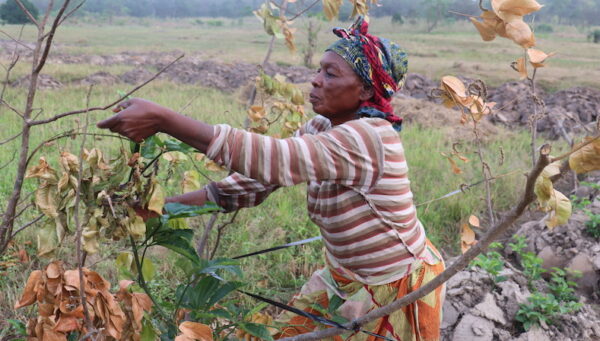Climate change: A growing threat to Nigeria’s agricultural sector

A Nigerian farmer laments impact of climate change. Photo credit: Orji Sunday
By Chinaza Osigwe
Despite it’s huge potential, Nigeria, Africa’s most populous country continues to grapple with a host of challenges which are impacting people’s lives and triggering conflicts over key resources. Climate change is one of them.
Climate change refers to an increase in average global temperature. There are some certain factors that might trigger it. Some of them maybe natural events or even human activities.
Nigeria is experiencing adverse climate conditions with negative impacts on the welfare of millions of people. Persistent droughts, flooding, and unseasonal rains and dry spells have disrupted the growing seasons in a country reliant on rain-fed agriculture.
Human activities such as burning of fossil fuels, coal and oil have led to high concentration of carbon dioxide in the atmosphere. Also, clearing of land for agriculture and industrial processes have to a lesser extent contributed to greenhouse effect.
The emissions of chlorofluorocarbons (CFCs), which are synthetic compounds that have industrial origin, have contributed to the destruction of the ozone layer thereby contributing to global warming.
Nigeria is not shielded from the rest of the world in terms of the effect of climate change. The outcomes of climate change have been felt across the vegetative regions of the country. Research has shown that climate change is increasingly becoming a major threat to agricultural productivity in Nigeria.
Some previously well-drained agricultural plains have recently become flooded, while the increasing aridity of the Sahel and Sudan savannah belts has adversely affected agricultural activities in the region (Ojo and Adebayo, 2012).
Other outcomes of climate change such as heavy precipitation, abnormal onset and cessation of rainfall, rising temperature and alteration in relative humidity have negative consequences on agricultural activities and food systems in Nigeria.
This alteration has led to disruption in the seasonal pattern of food production and distribution, thereby creating shortfall in supplies which bring rising food prices and limited access to food.
Frequent and intense climate related disasters wipe out vast stretches of farmland and can destroy the entire harvest. This ultimately affects the country’s food supply. Overtime, recurring foods and droughts make farmlands barren and reduces the quantity of food that can be grown.
With Nigeria’s population estimated to be growing at an annual rate of 3.2% and projected to increase from the current 218 million people to more than 400 million by 2050, actions to improve resilience are urgently needed.
With increased migration to urban centres which are expected to expand by 70% by 2050 food demand pressures will continue to grow and reduced farm labour availability increasingly constraining food supply.
If adequate measures are not taken to curtail the effects of climate change, then the country might go into food crises fully by 2050. According to a report by UNICEF, one out of three children experience child food poverty due to climate change and conflict currently.
To help farmers cope with droughts, climate smart agricultural innovations to conserve water such as solar – powered drip irrigation and rain water harvesting have been rolled out.
It is necessary for the government to initiate adaptive measures to cope with challenges arising from climate change , especially identifying emerging food safety risks that are linked to climate changes.

